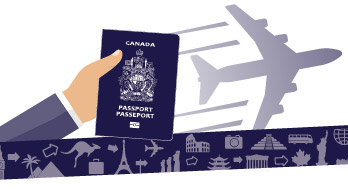Travelling as a dual citizen
New entry requirement now in effect
Visa-exempt foreign nationals need an Electronic Travel Authorization (eTA) to fly to or transit through Canada. Exceptions include U.S. citizens and travellers with a valid Canadian visa. Canadian citizens, including dual citizens, and Canadian permanent residents cannot apply for an eTA.
The leniency period that allows travellers to board their flight without an eTA ends soon.
Be prepared: Apply for an eTA before you book your flight to Canada. Most applicants get approved within minutes. However, some applications can take several days to process so don’t wait until the last minute.
Dual citizenship means that you are a citizen of more than one country. While having dual (or multiple) citizenship is legal in Canada, some countries do not legally recognize dual citizenship. This may limit or even prevent Canadian officials from assisting you, especially if you are incarcerated.
Should you choose to travel to your other country of citizenship, you should be aware of local laws and regulations that may be imposed on you as a result of your citizenship in that country. For example, you may be legally required to register for military service or you could have tax obligations.
If you think you may have dual citizenship in another country, please consult the Travel Advice and Advisories and the relevant foreign embassy or consulate in Canada before you travel. This could reduce the risks and difficulties for you and your family when you travel there.
Travel tips
Use your Canadian passport and always present yourself as Canadian to foreign authorities, especially when entering and leaving the country where you are a dual citizen, unless you are legally required to enter and exit the country using a passport issued by that country.
Before leaving Canada, it is your responsibility to research the local laws to find out if you have obligations in the country of your dual citizenship, such as taxes, military service, or repayment of educational costs. Confirm this information in writing before you leave Canada and carry the document with you while you are travelling.
Dual citizenship and parental child abductions
Many international parental child abductions involve parents and children who are dual citizens. Officials of the government of the country where the parent and/or child is a dual citizen will determine whether or not to issue the child a passport or visa. If you are worried about your child being abducted, you or your lawyer can ask the foreign government not to issue these documents. However, the foreign government may not comply.
To request another country not to issue a visa and/or a passport to your child, write to the relevant country’s embassy or consulate. Include certified copies of any court orders outlining custody decisions or necessity for consent concerning removal of your child from Canada. You must also send a copy of this request to Global Affairs Canada’s Consular Services (see the contact information ) and inform the embassy or consulate of the country where the child has dual citizenship that you have done so.
For more information, visit our Child abduction and custody issues page or consult the publication International Child Abduction: A Guidebook for Left-Behind Parents.
Canadian citizens requiring more information can also call 613-944-6788 or email travel@international.gc.ca.
- Immigration, Refugees and Citizenship Canada
- Travel documents for dual Canadian citizens travelling to Canada, Immigration, Refugees and Citizenship Canada (IRCC)
- Electronic Travel Authorization (eTA) Help Centre (IRCC)
About your passport

Find out about Canadian passports and the advantages of an ePassport.
Dual Canadian citizens: Fly to Canada with a valid CDN passport

Starting November 10, 2016, you will need a valid Canadian passport to board a flight to Canada.
Help Centre

Find quick and direct answers to your questions about Canadian passports, completing an application, and other travel information.